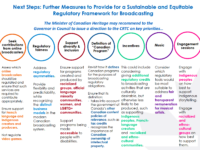The Broadcasting Act blunder series has made several references to the risk of a trade challenge over provisions found in Bill C-10. This post unpacks the trade issue and explains why the bill could result in billions of dollars in retaliatory tariffs against Canada. The starting point for the trade issue is to recognize that Canada negotiated the continuation of the cultural exemption in the Canada-US-Mexico Trade Agreement (CUSMA or USMCA). This was viewed as an important policy objective for the government, with Prime Minister Justin Trudeau insisting that “defending that cultural exemption is something fundamental to Canadians.” The exemption means that commitments such as equal treatment for U.S., Mexican and Canadian companies may be limited within the cultural sector.
Yet the cultural exemption did not come without a cost.











